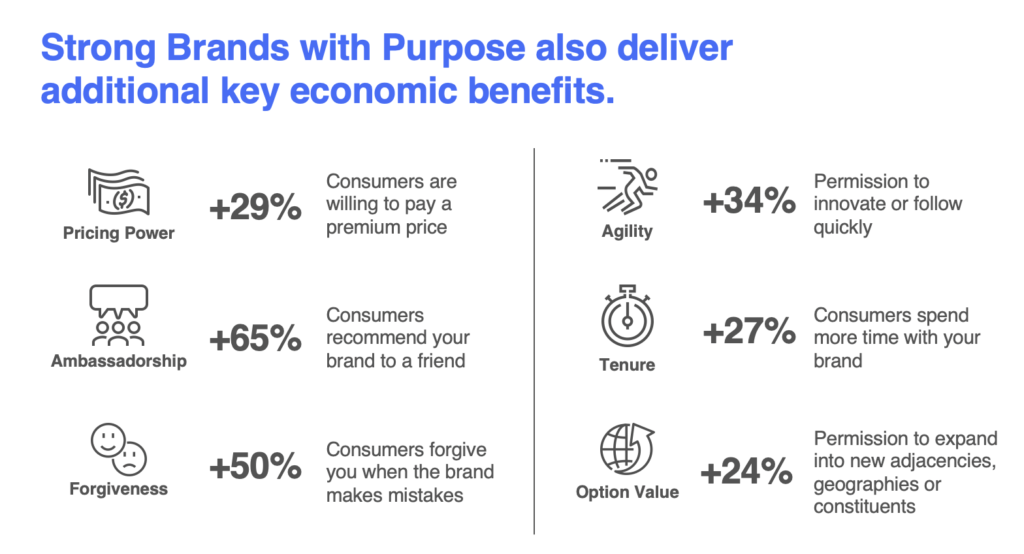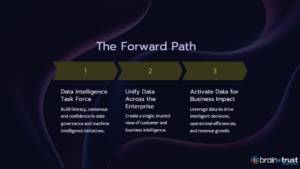With special thanks to my inspiring co-author, John McNeel.

Cause- or Purpose-based marketing has traditionally been a ‘nice-to-have’ — a brand’s way of broadcasting to the world that, beyond building good products and services, it could also be a good citizen. Brand Purpose efforts have rarely been subject to the rigorous discipline of Return on Investment, but increasingly many companies have felt these initiatives were nonetheless an important and worthy thing to do.
In the meantime, as if they had a split personality, these same brands have become intensely data-driven. An obsession with accountability, ROI and ROAS developed, and hard metrics were demanded from every marketing dollar. It seemed Marketing and Purpose lived in different worlds. Until now.
The advent of new dimensions in the consumer persona have engineered a virtual revolution in Big Data. Today, the Consumer Data Platform (CDP) has become the new holy grail of marketing: a means to map customer journeys with never-before-seen accuracy and to leverage newfound depths in our understanding of consumer behavior. By enabling a brand to ingest, deduplicate and structure data from every touchpoint between that brand and their consumers, data now tells a much richer consumer story. Including not only who they are, but what they care about the most.
Going deeper, to truly understand the person, and therefore their motivations and intentionality, means that savvy brands recognize first that people are beyond complicated. Variances abound and generational differences show the need for data-driven optimization and alignment of the various levers of brand strategy, including Brand Purpose. Data science can be deployed to translate the mass amount of information produced daily into actionable emotional insights, speaking not only to the consumer’s needs, wants and sentiments but to their core values.
One of the most powerful discoveries unearthed by a greater understanding of WHY and HOW consumers do what they do is that, increasingly, people are making their presence felt not only as consumers but as citizens. Afdhel Aziz and Bobby Jones say it well:
Growing up in a time when everything including traditional values, politics, and economics are collapsing and being redefined around them, millennials are experiencing a unique confluence of empathy and empowerment.
Good Is The New Cool: Market Like You Give A Damn
Afdhel Aziz and Bobby Jones (Regan Arts 2016)
Often without having sought to be there, brands today are sitting at the intersection of crucial societal movements and, whether they like it or not, must participate in shaping the public debate. As a brand considers engagement, conversions, latency windows and dozens of other metrics, so must it now learn how to rise above Corporate Social Responsibility (CSR) as a silo-ed box-ticking exercise and begin to treat it as a discipline vital to a brand’s ability to connect with consumers in more meaningful ways.
The science of how people reflect societal concerns in their purchase behaviors is rich. We can analyze the impact of offering an option for charitable contributions via a loyalty program on customer lifetime value (CLTV), engagement frequency, brand evangelism and customer satisfaction scores. Brand intelligence and brand equity analyses can be conducted through this lens as well. Review of social giving patterns further yield insight into the nuances of consumer passions and empathies and how geography, cause-type and size of the non-profits they favor provide an opportunity to understand their individualized form of citizenry.
Yash Gad, leading data scientist and Founder/Chief Executive Officer of Ringer Sciences, says of purpose-based data:
The tools and data science approaches we have historically used to model customer behaviors in retail and marketing spaces can (and should) be repurposed to create the next generation of insights into purpose-based data sets. The result will be a richer understanding of the landscape of charitable giving, and more actionable markers for brands.
Yash Gad
The results of data-driven work in the Brand Purpose space have far-reaching ramifications. They quantify the impact of CSR efforts, tethering them directly to business outcomes. They lead to the development of a more meaningful consumer experience (CX), which directly determines brand loyalty and evangelism. They drive the opportunity for personalization in communication, media and product development. And, importantly, these results fuel employee retention and diversity and inclusion efforts.

Data can be the missing link to take Brand Purpose beyond a box-ticking exercise or a duty that good corporate citizens feel they should fulfill. By connecting the dots between beliefs and behavior, purpose-driven data sets help companies show up in a much more relevant and meaningful way. Brands can put a stake in the ground on important social issues to drive transformational change and revenue at the same time.
This work is only beginning but in these times of global pandemics and persistent social unrest, it’s critical that companies, brands, data analytics partners and social good organizations form new coalitions to demonstrate that, yes, there truly is a Return on Purpose.
With so many essential business metrics tethered firmly to Brand Purpose efforts, the final word goes to Jim Stengel, the world’s leading evangelist for purpose-driven brands:
We must find a scalable way to better measure purpose activation and its relationship with business results, or purpose as a way of doing business will not be sustained.
Jim Stengel
John McNeel is the Founder and CEO of CHANGEx, a social purpose management consultancy, and Co-Founder and Chairman of in/PACT, a leading cloud-based charitable giving platform. John also serves as President, Social Purpose at The Next Practice, a founder-driven collective of firms leveraging analytics, digital media and marketing communications to build what’s next in business.
Tracy Arrington is the Chief Operating Officer of Brain+Trust Partners, a strategic consultancy making sense of disparate systems and data sets to drive consistent revenue growth for brands. She is the Chief Experience Officer of The Next Practice and also serves as an Assistant Professor of Practice in the acclaimed Texas Media and Analytics program at the University of Texas at Austin.






